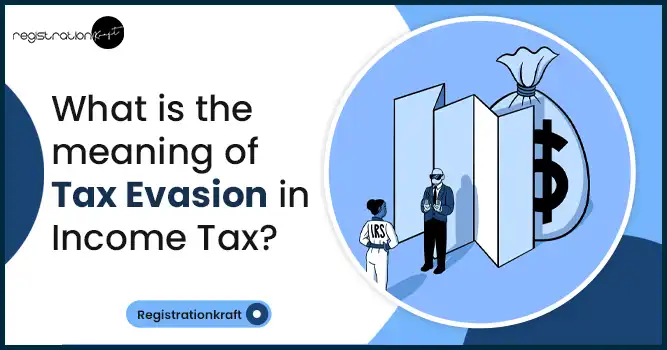What is the meaning of Tax Evasion in Income Tax?

In the successful economy of any country, the role of taxes is quite crucial. Whether you are a salaried individual or a businessman, you are governed by the applicable tax laws set by the government. The government does not only update these regulations from time to time, but it also makes provisions to help taxpayers save on the amount they pay in the form of tax.
Despite these initiatives by the government, many people get into wrongdoings and end up evading the tax payments to reduce their tax liability. According to a recently published report, it has been found that the tax authorities have been losing over Rs. 75000 crore annually just because of tax evasion. Here, it is important to keep in mind the government has put in place provisions of heavy penalties for those who get into the practice of tax evasion. Let’s get to know more about tax evasion in detail in the further part of this post.
What is Tax Evasion?
Tax evasion refers to the unlawful practice of avoiding the tax liability done by a person or business. It is considered a grave offence and the person and business are charged under criminal law and hefty penalties. For example, avoiding total tax payments or paying less than what is due is considered tax fraud and is counted as tax evasion. Tax evasion may also include showing wrong income, claiming deductions without proof, failing to declare cash transactions, etc.
The applicable penalty for tax evasion can vary from 100% to 300% of the due tax amount. It is advisable to pay the due tax amount to avoid paying hefty penalties and criminal persecution.
What is Tax Evasion in Income Tax?
It is very simple. Any kind of tax evasion that is done in relation to income tax is called income tax evasion. It is typically done by individuals to avoid their tax liability towards the authority.
How Tax Evasion is Done by People?
Tax evasion is done by people in several ways like:
Mentioning incorrect information in ITR – Filing ITR (Income Tax Returns) is a big obligation as per the IT Act of India. Many taxpayers employ numerous ways to dodge paying taxes by mentioning incorrect information in their ITR form in relation to their income, investments, or other important deductions.
Disregard highlighting an income – Some folks try to conceal cash transactions which may show a jump in their income. For example, a house owner who has put his house on rent will say that he takes the rent as a cash payment rather than a cheque or bank transfer.
Maintaining bank accounts in other countries – The Indian tax authorities don’t have easy access to bank accounts belonging to other countries. Thus, people sometimes highlight bank accounts internationally and save money.
Wrong presentation of financial documents – Several businesses get into fabricating crucial financial documents like the balance sheets, profit and loss statements, etc., to reveal a lesser annual income.
Giving bribes to tax officials – There are many folks who try to give an amount of money in the form of a bribe to a tax official with a purpose of altering the tax liability for their personal advantage.
Smuggling – A few organizations require paying import-export taxes, state taxes, customs duties, etc. Thus, people get into smuggling chores to avoid the applicable taxes.
Non-payment of tax liability – In spite of knowing the payable tax amount, some folks deliberately don’t pay the tax amount to the authorities.
Is Tax Evasion Illegal?
Yes, any kind of activity that is done to evade the payment of tax is considered an illegal activity. Whether you are an individual or a business, paying the applicable tax amount to the respective tax authority is mandatory. Tax evasion is considered a serious offense and incurs hefty penalties. It comes under the category of tax fraud and could lead to serious consequences.
Must Read: What happens if you miss the ITR filing deadline?
What are the Penalties for Tax Evasion?
There are different types of penalties that one needs to face due to indulging in tax evasion activities. Be it an individual or a business, the penalties can be different in both cases. In general, the tax payers need to pay a hefty tax amount due to tax evasion.
Some of the commonly applicable penalties for tax evasion are:
- Taking 100% to 300% of the applicable tax if the income is not disclosed properly
- Due to the nonpayment of the due tax payment, the tax authority may decide a penalty amount that cannot be more than the total due tax amount
- If a taxpayer doesn’t pay the tax amount by its due date, the authority may charge a sum of Rs. 200 per day post the due date.
- If the proper income is not disclosed by the taxpayer, the tax penalty can range from 100% to 300
What are the Most Common Causes of Tax Evasion?
Some of the common causes of tax evasion are:
- Presence of tax heavens
- Inefficiency of tax authorities
- Complicated tax laws
- Lack of integrity among taxpayers
- Existence of a large casual economy
What is the Difference between Tax Evasion and Tax Avoidance?
Tax evasion refers to choosing illegal ways to avoid paying the due taxes to tax authorities. There are hundreds of ways, taxpayers choose to reduce their tax liability such as showing lesser income, indulging in cash transactions, or storing money overseas.
On the other hand, tax avoidance refers to the employment of lawful strategies present in the existing legal system by an individual or business to reduce their tax liability. Since these strategies are lawful, taxpayers are allowed to make the advance of these laws to bring down their tax liability.
A few examples of tax avoidance are mentioned below:
- Investing money in various financial instruments like life insurance policies, Mediclaim policies, and mutual funds to reduce the overall tax liability
- Seek benefits on the payable taxes by showing interest being paid on a home loan, tuition fees, etc.
- Donating money to eligible charitable trusts or political properties to seek tax benefits
The Conclusion
Though the incidences of tax evasion are quite common in today’s scenario, it is essentially an illegal activity that must be avoided by taxpayers to avoid serious consequences due to noncompliance. Whether you are an individual or a business, tax evasion tends to affect all types of taxpayers in an adverse way.
Categories: Taxation
Tags: business transparency, Finance, Income Tax





